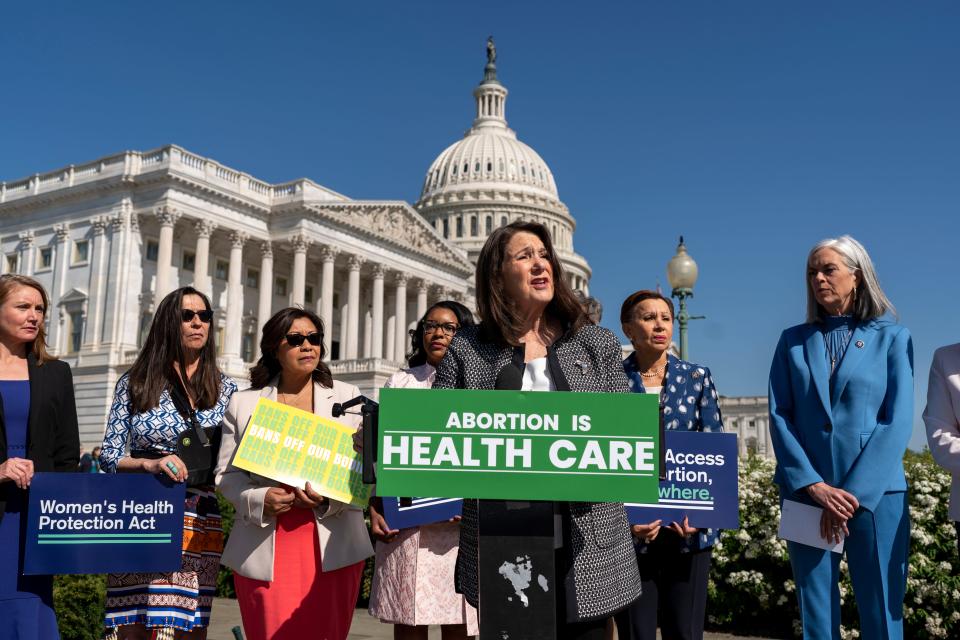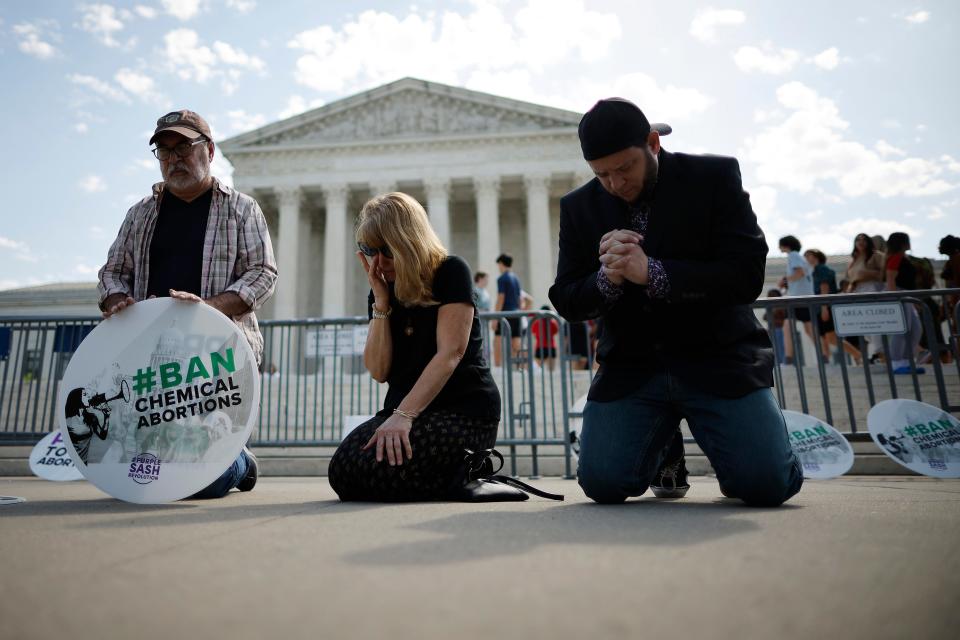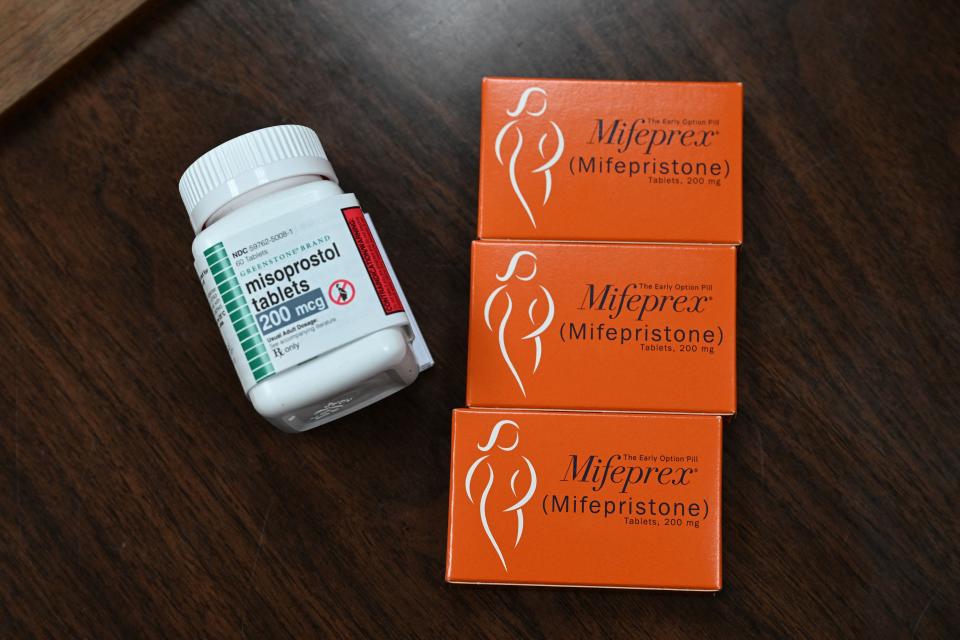Abortion pill challenge gives Supreme Court chance to move toward national abortion ban
WASHINGTON ? Two years after the Supreme Court erased the constitutional right to an abortion, creating a patchwork of access across the country, the justices could now pave the way toward a national ban.
In a case they will consider Tuesday about access to the abortion drug mifepristone, the court could give legitimacy to a 19th-century obscenity law that some abortion opponents are promoting as a de facto federal abortion ban that just needs enforcing.
Even if the court decides the case without addressing the 1873 Comstock Act ? which it could easily do ? the justices could restrict access to mifepristone in a way that would make it more difficult for millions of women to end a pregnancy in states where abortion is legal.
The result would be an end run around the court’s stated purpose, when it overturned Roe v. Wade, of leaving the question of abortion to Congress and the state legislatures, according to abortion rights advocates.
More: VP Kamala Harris broke politics at an abortion clinic visit. She even said the 'u' word

Keeping in place a lower court’s decision restricting access to mifepristone, more than 640 state lawmakers wrote in a brief to the court, would “wrest the power to decide abortion access issues back out of the hands of state legislators.”
Abortion opponents say it’s the Food and Drug Administration that is doing the end run around the Supreme Court’s 2022 decision by enabling women to circumvent state abortion bans by allowing unreasonably easy access to mifepristone.
The FDA’s actions “rob from the people important decisions on this vital issue,” the attorneys general of 22 states told the court.
'Abolished from coast to coast': Anti-abortion movement looks to cities as target for bans

Mifepristone used in most abortions
More than 6 in 10 abortions in the United States last year were completed with pills, according to the Guttmacher Institute, a research group that supports abortion rights.
The Supreme Court is deciding whether the FDA improperly relaxed requirements on mifepristone, one of the two drugs used in medication abortions for early pregnancies. The New Orleans-based 5th U.S. Circuit Court of Appeals said the FDA should not have allowed mifepristone to be dispensed through the mail, along with other changes.
The Biden administration said the agency’s decisions were based on extensive evidence and the case marks the first time a court has restricted access to an FDA-approved drug by second-guessing the agency’s expert judgment.
Besides disputing the FDA’s conclusion that the changes it allowed are warranted, the anti-abortion groups challenging mifepristone also argue the FDA is violating the Comstock Act.
Related How the Supreme Court case on the abortion drug mifepristone could affect 2024 election
Abortion drug could be blocked by the 19th century Comstock Act
The long-dormant law prohibits mailing "lewd or lascivious" material, as well as anything that could be used to cause an abortion.
Named for the anti-vice crusader and U.S. postal inspector Anthony Comstock, the law’s scope was narrowed over the years by courts and Congress and hasn’t been enforced by the federal government since the 1930s.
But the federal judge – appointed by former President Donald Trump ? who first heard the mifepristone challenge said the Comstock Act prohibits the mailing of abortion drugs.
While the appeals court did not rely on that law in ruling that the FDA went too far, anti-abortion advocates have raised it in their filings to the Supreme Court.
Related: Welcome to Bristol, where America’s abortion debate is right on your doorstep

They argue the Justice Department was wrong to say last year that the law’s prohibition on mailing abortion drugs applies only to those used for illegal abortions. The department issued that decision to make it clear the U.S. Postal Service could deliver abortion pills ? even in states that have banned or restricted abortion access ? because they can be used for other purposes, including to manage miscarriages and for abortion-ban exceptions.
That interpretation of the law is strongly rejected by 145 Republican members of the House and Senate.
“The FDA blatantly violated the prohibition on mailing chemical abortion drugs by permitting mail order chemical abortions,” the lawmakers wrote in a brief supporting the mifepristone challenge.
Former Attorney General Edwin Meese III and attorney Jay Sekulow, who represented Trump during his first impeachment and is now chief counsel at the American Center for Law and Justice, made similar arguments to the court.
Dividing Line: Welcome to Bristol, where America’s abortion debate is right on your doorstep
Will the Supreme Court shut down all abortions?
In addition to the legal action, the conservative Heritage Foundation has put together a policy playbook in case Republicans retake the White House that includes ending “mail-order abortions in violation of long-standing federal laws.”
“They are really putting a lot into this because it's a workaround from having to actually pass an abortion ban, which they know they can't do,” said David S. Cohen, a professor at the Drexel University Thomas R. Kline School of Law.
More: Supreme Court allows Idaho's near-total abortion ban in emergency room in blow to Biden
He considers the Comstock Act the most significant national threat to abortion rights, through either a Supreme Court ruling or a second Trump administration.
Banning abortion drugs from the mail wouldn’t just keep women from directly receiving them, Cohen said. The drugs also could not be shipped to doctors. Neither could medical supplies or instruments needed for surgical abortions, he said.
“That interpretation could shut down all abortions,” he said.
Julie Kaye, an attorney with the American Civil Liberties Union's Reproductive Freedom Project, said it's possible ? though it would be surprising ? for the court to signal that "this zombie law from the 1800s can be used to ban all abortion without any involvement from Congress."
In the Justice Department’s briefs to the court, Solicitor General Elizabeth Prelogar reminded the justices that the appeals court decision they are reviewing did not address the Comstock Act.
“And this court,” she added, “should not either.”
This article originally appeared on USA TODAY: How mifepristone Supreme Court case could foreshadow abortion ban
